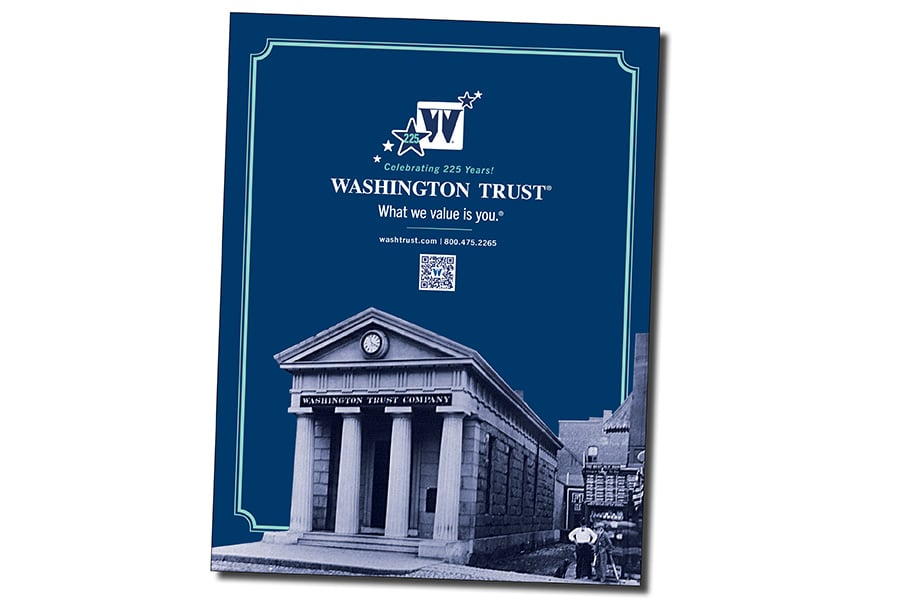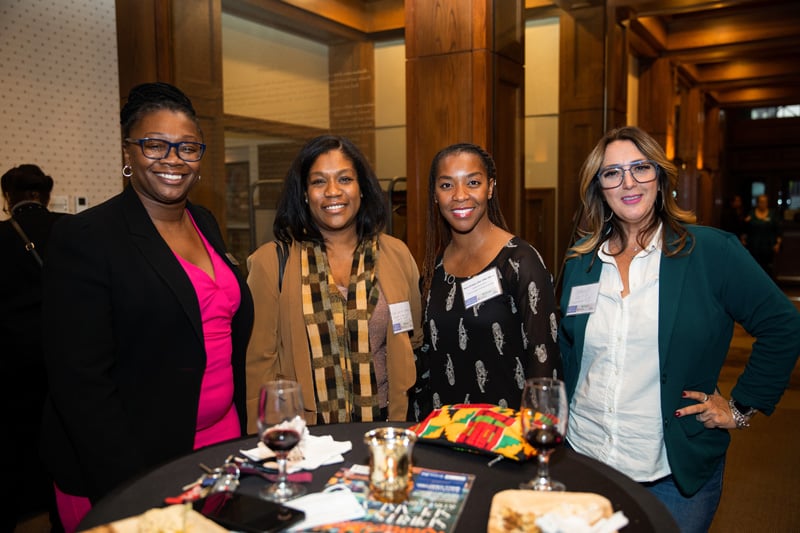First Person: Inside the Victorian on Grace Street
It's hard to feel at home when family moves on from the place where you grew up, but there are lessons learned along the way.

Ellen with her brother Jon and father at the newly purchased Grace Street home. Photography courtesy of Ellen Schmedinghoff.
My story of Grace Street started in the soupy summer stretch between kindergarten and first grade, saddled between two worlds — the only home I’d known in Providence, and a new house in Cranston.
My familiar world was a three-story tenement that rose high above the dead end of Hamlin Street. We made every inch of it ours, naming every corner, each room with its own distinct role. Our life here had some electric energy, our young family moving with the rhythm of a Providence neighborhood in the ’90s and its endless loop of 92 PRO-FM and KIX 106, a stream of cars running down Route 95 behind the house. The four of us, my parents, my brother, me — we were growing up together, tucked inside a home that had sheltered generations, built by my great-great grandfather and his son. I often have dreams about returning here, discovering some trap door or extra room, swept up again in its magic.
My new world took shape five minutes away in Cranston — a pink Victorian on the corner of Park Avenue and Grace Street, built in 1890. It came with an empty lot that unfurled into overgrown gardens — traces of its former owner. Mrs. Pratt’s potting shed, wild roses and heavy fruit trees across the yard dazzled me. We didn’t know her, but she lived there with us — little pieces of her life, our discoveries long after we’d settled.
As houses tend to do, this place took shape around us. More out of necessity and less of a DIY project, my mom’s parents helped us make it ours. They ripped out floors and walls, put doors and windows where there were none, wrote messages for the future on new plaster beneath new wallpaper. The sudden activity at this old house created a kind of bat call, summoning kids in the houses around us. Our neighborhood crew formed — Amanda and I, the only girls in a pack of boys. Our place was ground zero for dreaming and creating, writing scripts, producing elaborate movies, singing and rapping and playing instruments.

Ellen and her cousins ready for cake at her birthday party. Photography courtesy of Ellen Schmedinghoff.
The yard was pruned and burst back beautifully. The basement came alive, music soaring through the house. The porch, with its warm breezes wafting through glass shutters, became our favorite dining room. We were at home again.
Old houses talk to you. There are echoes in rooms and creaks in steps. A nightly soundtrack of hissing radiators and groaning floors — expanding, contracting. It lived and breathed right along with us — a witness to our lives. We were never alone, so many people we adored were always just kind of there. My parents, my grandparents and our cast of friends, all in each other’s orbits, these daily exchanges so beautifully commonplace.
But that was life in Cranston — there was a whole circuit of homes and families like mine, some silent agreement between parents — your kids are welcome here, safe here. Somebody was always home somewhere, a TV blaring, a cabinet with your favorite snack. A five-minute drive in any direction and you’d find someone you love with time on their hands.
I became a homeowner myself almost ten years ago with a 1,000-square-foot ranch just outside of downtown Charleston, South Carolina. I moved there at eighteen, and the twilight of my twenties felt like the right time to buy something. I imagine the house was flipped before I moved in — it was in near-perfect condition. No dramatic projects to be done. No walls to move, no floors to tear out. A yard neatly lined in azaleas and camellias, everything set in its place.
I felt disappointed by this foreign homeowning experience. The silence and perfection scared me, and I made the house a stranger for years. I took every opportunity to not be here — traveling, dog sitting, weekends and nights away. It wasn’t until I was forced to be with my home around the clock during those strange pandemic days that I got to know it better. It developed a glimmer similar to the houses I grew up in — suddenly a part of me, standing in support of me.
Grace was a name so apt for our experience on its street corner. Our lives there were orchestrated with serendipity from the outset, my mother adoring the unlisted house as she shuttled us from Providence to school at Cranston Academy, it suddenly hitting the market for just under their shoestring budget. That my dad’s father was able to see it on a VHS tour we recorded for him in the final days of his swift battle with cancer. Set against this grand loss, the house was a refuge for us — something to focus on, to move us along. The end of my story on Grace Street was no different.
As my South Carolina summer sizzled during the height of the pandemic, I finally sprung from my home and drove up the coast with my seventy-five-pound rescue dog. I’d planned a whole month in New England, a homeland pilgrimage. A dream of mine since afternoons spent boogie boarding near the sea wall as a kid, I made my homebase a massive, rented beach house off Ocean Road in Narragansett. I let sea air blow through open windows, walked to the ocean each day to sit in the sun and get knocked over by salty waves, toting Willow Tree chicken salad sandwiches wrapped in tin foil. My aunts and cousins and best friend all rotated through, sitting under the stars, eating quahogs and steamers. It was bliss. But it was strange. Grace Street was empty, about to be sold. My parents were gone after months of painting, patching and packing. COVID robbed so many of so much — and this was my grand loss, I thought — no chance to pack up thirty years of memories, no goodbye.
But by some stroke of luck — or should we call it grace — my trip aligned with a short window to have a few moments there before its closing. The house was able to see me off one final time: as content as I’d ever been, life feeling open and limitless, my beach-tanned skin, my dark hair, my big smile. I was just a taller version of the little summer girl who was so mystified by this place. I clipped my mom’s hydrangeas and lily of the valley, nesting them in an empty Cafe Bon Ami coffee cup. Grabbed my dad’s collection of crystals and geodes in the garden, setting them on the floor of my car. Little pieces of our lives, with more for the next owners to discover.

Ellen and her nephew Sam at the Grace Street house for
the last backyard party for her dad’s retirement. Photography courtesy of Ellen Schmedinghoff.
I’ve returned to Rhode Island many times these last five years for births, funerals, weddings, and all the goodness in between. That muscle memory remains — bursting out of the gate at T.F. Green, looking for the Dunkin’ Donuts gate, rounding the corner to the escalator down. I still expect to see my parents waiting at the bottom. I look down certain streets for cars in familiar driveways; I still expect to go to Grace Street. It’s a different place without that house as an anchor. Home doesn’t feel as far away as it did for most of my twenties. My orientation to the world is different now.
I like to razz my mom and dad that the most Rhode Island thing they’ve ever done is retire, sell their house and move to Florida for warm weather and grandkids. They’re only six hours away, close to my brother and his family. Our life together has regained some of that fluidity we grew up with. Easier comings and goings.
I look around my parents’ house now — so big, bright and new. It’s a far cry from our beginnings. I think of the characters who moved through our house — so many of those girls, now women, are still in my life every day. Without familiar walls around us — the places that used to wrap us up, bearing witness to our lives — we are each others’ memory keepers. We are all still growing up together.
______________________________
Have an idea for First Person? Send editor Jamie Coelho a note at jcoelho@RIMonthly.com.
































